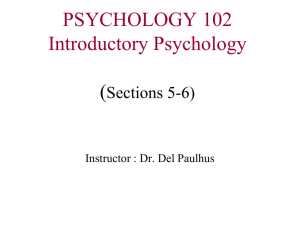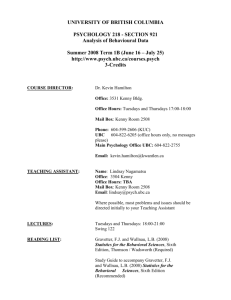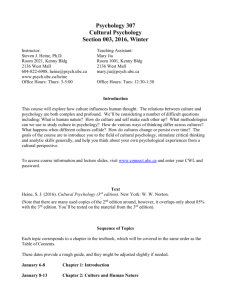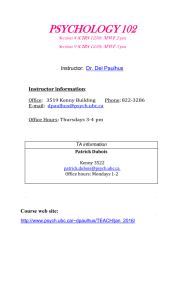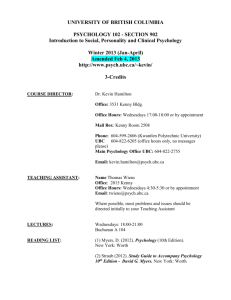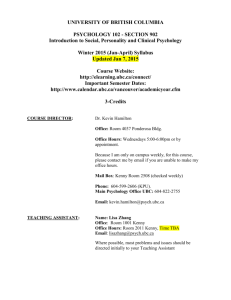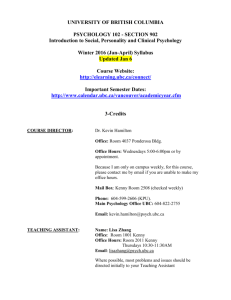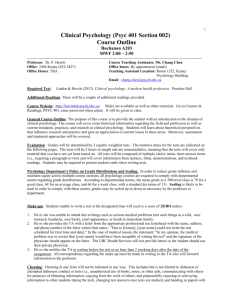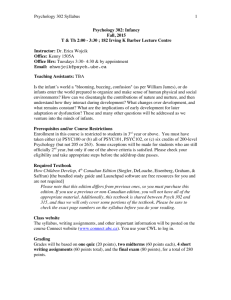Syllabus_101-901_11-3 - University of British Columbia
advertisement
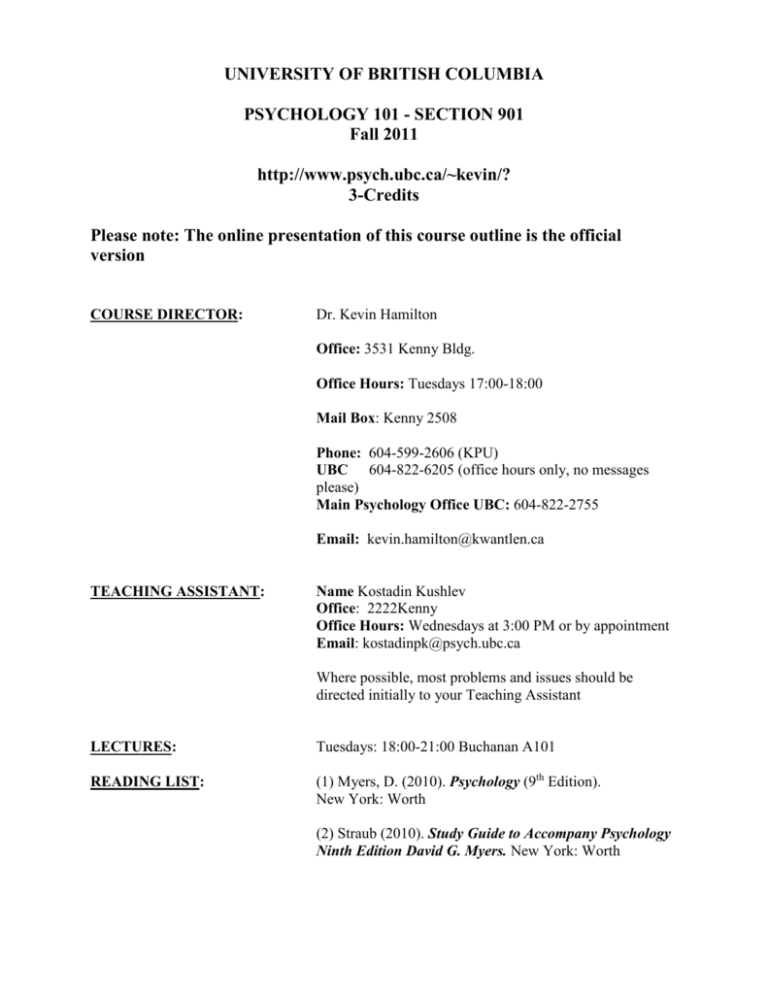
UNIVERSITY OF BRITISH COLUMBIA PSYCHOLOGY 101 - SECTION 901 Fall 2011 http://www.psych.ubc.ca/~kevin/? 3-Credits Please note: The online presentation of this course outline is the official version COURSE DIRECTOR: Dr. Kevin Hamilton Office: 3531 Kenny Bldg. Office Hours: Tuesdays 17:00-18:00 Mail Box: Kenny 2508 Phone: 604-599-2606 (KPU) UBC 604-822-6205 (office hours only, no messages please) Main Psychology Office UBC: 604-822-2755 Email: kevin.hamilton@kwantlen.ca TEACHING ASSISTANT: Name Kostadin Kushlev Office: 2222Kenny Office Hours: Wednesdays at 3:00 PM or by appointment Email: kostadinpk@psych.ubc.ca Where possible, most problems and issues should be directed initially to your Teaching Assistant LECTURES: Tuesdays: 18:00-21:00 Buchanan A101 READING LIST: (1) Myers, D. (2010). Psychology (9th Edition). New York: Worth (2) Straub (2010). Study Guide to Accompany Psychology Ninth Edition David G. Myers. New York: Worth 2 GENERAL COURSE DESCRIPTION: Psychology is the scientific study of human behaviour. This course is designed to promote critical thinking skills and to introduce students to several key areas that make up the field of Psychology. Areas discussed are listed under 'Topics and Required Readings'. Please note that this is a 3 credit course. Including in-class and out of class time, students should be prepared to devote at least 6 hours per week to the course. The format for the course is one - 3 hour lecture per week, which includes time for discussion and films. COURSE REQUIREMENTS AND EXAMINATIONS: You are responsible for all course readings listed under 'Topics and Required Readings'. In addition, you are responsible for all material presented in lectures that may not be covered in your text. This includes supplemental topics and issues presented in films shown regularly throughout the course. Before coming to each class, it is highly recommended that you read the appropriate sections in the text to be discussed that day. This will greatly facilitate your understanding of material covered during class. Participation in class discussion is encouraged and regular attendance is extremely important and expected. Students unavoidably absent because of illness or disability should inform the instructor and report to the instructor on returning to class. The grade for this course is based on 2 in-class exams consisting of both multiple choice and short answer questions (80% and 20% respectively). The exams are not cumulative. Each is on a different section of the course and each counts for 50% of the overall grade. In order to reduce grade inflation and maintain equity across multiple course sections, all psychology courses are required to comply with departmental norms regarding grade distributions. According to departmental norms, the mean grade in a 300-level class is 70 for a good class, 68 for an average class, and 66 for a weak class, with a standard deviation of 13. The corresponding figures for 100- and 200-level Psychology courses are 67, 65, and 63, with a standard deviation of 14. Scaling is likely to be used in order to comply with these norms; grades may be scaled up or down as necessary by the professor or department. There are no make-up exams or assignments in this course. If an exam is missed, you are required to notify the Teaching Assistant or Course Director within 48 hours of the exam time. An equivalent form of the exam can be written with the Teaching Assistant when you return to the University. Please make these arrangements directly with the Teaching Assistant. A verifiable Doctors note must be provided in order to write an exam outside the scheduled time. When writing Exams, please bring a dark pencil (N0. 2 or HB). This is required for machine scoring your multiple choice answer sheets. A pen will be required for short answer questions. Also, you will need picture ID and your student number (found on your library card). Examination dates are indicated below. All exams are 2 hours in duration. If you are interested in viewing your exams please make arrangements directly with the TA. 3 Subject Credit: In addition to your exam scores, you have the opportunity to earn up to 3 extra percentage points on your overall final grade by participating in studies regularly conducted by the Psychology Department and coordinated through the human subject pool (HSP). This provides the valuable opportunity to observe the research process directly and to contribute to the ongoing research activities at UBC. The extra grades are obtained by signing up for the Introductory Psychology Subject Pool through their web site http://hsp.psych.ubc.ca. 1/2 percentage point is assigned to your final grade for each 30 min. of participation. Credits can be recorded and tracked via the subject credit website http://hsp.psych.ubc.ca. Your credits are added to your grade at the end of the course. Make sure that you retain your portion of the experimental credit receipt in the event that verification of participation is required when the final grades are compiled. As an alternative to participating in studies, you may choose to complete library writing projects, in which you read and summarize a research article; each article summary counts as one hour of research participation. You must select a research article (not a letter to the editor, commentary, or review paper) published between 2000-present in the journal Psychological Science. Each summary should be about 500 words and should include the purpose, method and results of the study. If you choose the library option, you must (a) create an account on the online HSP system and follow the instructions provided. http://www.psych.ubc.ca/hsp/Subject%20Pool%20Information%20for%20Participants.pdf Academic Dishonesty: Please note that academic dishonesty will not be tolerated at UBC. Cheating, plagiarism, and other forms of academic misconduct are very serious concerns of the University, and the Department of Psychology has taken steps to alleviate them. The Department has implemented software that can reliably detect cheating on multiple-choice exams by analyzing the patterns of students’ responses. In all cases of suspected academic misconduct, the parties involved will be pursued to the fullest extent dictated by the guidelines of the University. Strong evidence of cheating or plagiarism may result in a zero credit for the work in question. According to the University Act (section 61), the President of UBC has the right to impose harsher penalties including (but not limited to) a failing grade for the course, suspension from the University, cancellation of scholarships, or a notation added to a student’s transcript In this course, academic dishonesty pertains primarily to the issue of cheating on exams. Examination protocol is posted on the board and reviewed prior to each exam. If you have any questions as to whether or not what you are doing is even a borderline case of academic misconduct, please consult your instructor. For details on pertinent University policies and procedures, please see Chapter 5 in the UBC Calendar (http://students.ubc.ca/calendar) 4 Special Needs: The University accommodates students with disabilities who have registered with the Disability Resource Centre. The University accommodates students whose religious obligations conflict with attendance, submitting assignments, or completing scheduled tests and examinations. Please let your instructor know in advance, preferably in the first week of class, if you will require any accommodation on these grounds. Students who plan to be absent for varsity athletics, family obligations, or other similar commitments, cannot assume they will be accommodated, and should discuss their commitments with the instructor before the drop date. Students have the right to view their marked examinations with their instructor, providing they apply to do so within a month of receiving their final grades. This review is for pedagogic purposes. The examination remains the property of the university. CLASS DATES, TOPICS AND REQUIRED READINGS Sept 6 (1) Introduction Prologue: The Story of Psychology Ch 1 Thinking Critically with Psychological Science Sept 13 (2) Research Methods and Data Analysis Ch. 1 Thinking Critically with Psychological Science Sept 20 (3) Neuroscience Ch. 2 The Biology of Mind Sept 27 (4) Behavioural Genetics Ch. 4 Nature Nurture and Human Diversity Oct 4-11 (5 &6) Sensation and Perception Ch. 6 Sensation and Perception Oct 18 Test 1 (50% Ch’s: Prologue, 1,2,4,6) Oct 25-Nov 1 (7) States of Consciousness Ch. 3 Consciousness and the Two-Track Mind Nov 8-15 (8) Learning Ch. 7 Learning Nov 22 (9) Memory Ch. 8 Memory Nov 29 (10) Cognition Ch. 9 Thinking and Language Last class HSP closes Dec 2 5 Test # 2 (50% ch’s: 3,7,8,9) will be held in the official exam period (Dec 6 – 20). The exact date will be announced mid way through the fall semester. Be sure not to schedule any travel etc. until after the exam date has been established.

